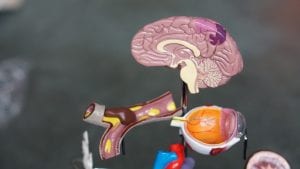Researchers publish a study on the correlation between dementia and clinical depression.
A new Swedish study found that men and women with depression were much more likely to develop dementia than those in the same age group without depression. Researchers accessed the Swedish National Patient Register and discovered 119,386 people over 50 with depression and matched them with the same number of people without a mental health diagnosis. “People with depression are at increased risk for dementia,” researchers reported of the link, “and the risk may persist for decades.”
“This is an observational study that does not prove causation,” said the lead author, Peter Nordstrom, a professor of geriatrics at Umea University in Sweden. “If you are diagnosed with depression, that doesn’t mean that you are bound to have dementia.”
According to the research, “Dementia developed in 5.7 percent of those with depression, compared to only 2.6 percent of those without depression, over an average follow-up of more than 10 years. Those with depression were more than 15 times as likely to develop dementia in the first six months after their depression diagnosis as their peers who were not depressed. That rate decreased rapidly but was still evident after 20 years.”

Scientists have long thought that a depression diagnosis could be the first sign of developing dementia that will significantly impact individuals later in life and clinicians have been thinking for a long time about the relationship between depression and dementia. They believe the link is due to the fact that depression increases inflammation of the brain and other chemical changes in the body, which could ultimately cause dementia.
In the Swedish study, researchers also took a look at “25,322 sibling pairs older than 50 in which one sibling had depression and the other did not.” They discovered “a sibling with a depression diagnosis was more than 20 times as likely as his brother or sister without depression to be diagnosed with dementia in the first six months after the diagnosis.”
A previous study published in 2015 also found a link between the two diagnoses. Researchers found, “sustained and disabling major depressive episodes are more common in those with dementia than in age-matched controls without dementia. The incidence of depression may be 30% in vascular dementia and in Alzheimer’s disease, and over 40% in the dementia associated with Parkinson’s and Huntington’s diseases. Practitioners caring for people with dementia should be alert to major depression as this will require specific management strategies.” It was concluded, “Concurrent use of non-pharmacological strategies and selected drug treatment gives the best opportunity for recovery from the depression and to reduce morbidity from the dementia.”
“I think older individuals are more in denial about having depressive illness,” says Dr. M. Cornelia Cremens, assistant professor of psychiatry at Harvard Medical School and a geriatric psychiatrist in the senior health practice at Massachusetts General Hospital. “They’ll say, ‘Well, I’m 83 years old, who wouldn’t be depressed?’ Ignoring sadness or dismissing it as a normal side effect of aging could allow potentially treatable memory issues to progress unchecked.”
Clinical depression is typically treated with antidepressant medications and psychotherapy. Certain supplements and lifestyle changes can also help alleviate symptoms.


Join the conversation!